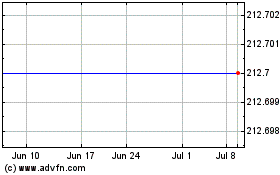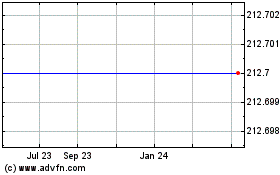UnitedHealth Stays Neutral - Analyst Blog
August 31 2011 - 4:27AM
Zacks
We are reiterating our Neutral recommendation on the shares of
UnitedHealth Group Inc. (UNH) following the
second quarter 2011 results. UnitedHealth Group reported second
quarter 2011 operating earnings of $1.16 per share, beating the
Zacks Consensus Estimate of 93 cents.
Earnings also compared favorably with 99 cents per share
reported in the prior-year quarter. Net earnings increased 13% year
over year to $1.3 billion in the reported quarter. Results were
aided by strong revenue growth from UnitedHealthcare, as well as
from Optum businesses.
UnitedHealth is benefiting from low medical utilization by
members owing to a lingering recessionary mind-set among Americans
who are postponing or forgoing medical care. This low level of
medical use has led to an increase in cash reserves and increased
profitability for the company. Lower-than-expected increases in
care use year to date has helped contain the company’s costs in the
form of lower claims paid.
We expect the company to post positive earnings surprises backed
by this trend, which is expected to prevail at least till 2011 end
as it will take a while for spending to recover from a recession as
bad as this one.
UnitedHealth Group is one of the most diversified of the listed
managed care companies. With a broad product and service offering,
the company targets the full spectrum of the population. As a
result, earnings are buffered to a certain degree against any
single change in market dynamics at the divisional level. This has
been witnessed by a growth in the company’s revenues for the past
five years.
Though the market remains challenging, we expect the company to
grow revenues, albeit at a slower rate. Since its December
guidance, the company has upped its revenue estimate four times,
which now stands at $101 million, implying an organic growth rate
of 7% year over year.
UnitedHealth’s health service business, which comprises
OptumHealth, OptumInsight, and OptumRx, is a very important part of
the company’s diversification strategy. Revenues from the health
services segment delivered a 17% year-over-year growth for the
second quarter 2011 and 20% year-over-year growth for the first
quarter 2011.
Management is expanding the health service business to 30–40% of
operating earnings over the longer term, and thus, the company has
been making acquisitions in the area. Currently, health services
generate about 20% of operating earnings. Management thinks that
the company is under-penetrated in the health service area and that
investment in this field will reap benefits over the long
term.
UnitedHealth stands healthy from a balance sheet perspective.
The company has maintained its debt-to-capital ratio at favorable
levels of 30.8% as of March 31, 2011. For the past five years, its
debt ratio stands at an average of 32.1%. The company is also
consistent in its dividend paying capability.
During May 2011, UnitedHealth raised its annual dividend by 30%
from 50 cents per share. The dividend was last hiked in May 2010 to
50 cents from a mere 3 cents per share. The latest dividend
increase is the highest level of hike currently in the industry.
Its annualized 10-year dividend growth rate has been 52.2%.
Historically, the company has favored share buybacks and mergers
over dividend payments as a way to deploy capital. The company has
been generating strong cash flow from operations, and this further
signals strong longer-term cash flow prospects.
Further, shareholder’s return will be maximized with regular
share repurchases. UnitedHealth spent $620 million in the first
quarter of 2011 to buy back 15 million shares, and expects to spend
$2 billion to $2.5 billion for repurchasing shares in full-year
2011.
The company has approved the repurchase of 110 million shares,
which is about 10% of UnitedHealth’s outstanding shares, at the
cost of about $5.3 billion. The company’s solid capital management
is reflected in its return on equity, which has averaged at 18.97%
for the past five years.
However, the U.S. recessionary economic environment has impacted
the demand for certain products and services of UnitedHealth. For
example, a reduction in workforce has lowered the number of health
care beneficiaries, thus putting pressure on top-line growth for
its Healthcare and OptumHealth businesses.
Moreover, UnitedHealth will expectedly witness increased
operating costs through 2011 due to higher medical and operating
cost pressures related to the Affordable Care Act and Mental Health
Parity Act. The company would also experience heightened expenses
for complying with the federally mandated ICD-10 coding and HIPAA
5010 standards.
Also, there remains a concern over low interest rates, which
will expectedly culminate into low investment income, thereby
putting earnings under pressure.
UnitedHealth is currently carrying Zacks #2 Rank, which
translates into short-term ‘Buy’ rating. The company competes with
Aetna Inc. (AET),
WellPoint Inc. (WLP),
CIGNA Corp. (CI) and
Humana Inc. (HUM), with the first
two carrying long-term Neutral recommendation and the other two
carrying long-term Outperform recommendation.
AETNA INC-NEW (AET): Free Stock Analysis Report
CIGNA CORP (CI): Free Stock Analysis Report
HUMANA INC NEW (HUM): Free Stock Analysis Report
UNITEDHEALTH GP (UNH): Free Stock Analysis Report
WELLPOINT INC (WLP): Free Stock Analysis Report
Zacks Investment Research
Aetna (NYSE:AET)
Historical Stock Chart
From Apr 2024 to May 2024

Aetna (NYSE:AET)
Historical Stock Chart
From May 2023 to May 2024
